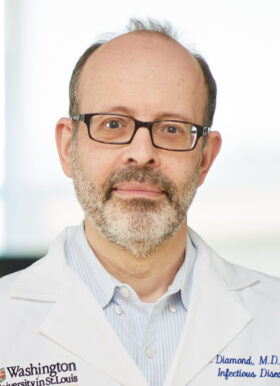
Michael S. Diamond, MD, PhD
The Herbert S. Gasser Professor, Departments of Medicine, Molecular Microbiology, Pathology & Immunology
- Phone: 314-362-2842
- Fax: 314-362-9230
- Email: diamond@nospam.wusm.wustl.edu
Dr. Diamond’s laboratory studies the molecular basis of disease of globally emerging RNA viruses, and focuses on the interface between pathogenesis and host immunity. He identified many of the key innate and adaptive immune system components that define protection against flaviviruses, and the viral genes that antagonize this response. His laboratory made a seminal discovery by identifying a novel pathogen-associated molecular pattern (lack of 2′-O methylation on the 5′ viral RNA cap) and mechanism of innate immune restriction through IFIT1 proteins. His group has used genome-wide screening to identify host factors required by viruses, including novel entry receptors for multiple alphaviruses of global concern. He has led the field in studying mechanisms of pathogenesis of Zika virus infection and disease including in pregnancy, and more recently studied how the microbiome modulates immunity and infection of arthropod-transmitted viruses His group also has generated, characterized, and mapped thousands of neutralizing antibodies against Zika, West Nile, Dengue, Mayaro, and Chikungunya viruses. His work has led directly to the development of antiviral therapeutic antibodies and vaccines against both flaviviruses and alphaviruses. Most recently, his laboratory has begun efforts to study the biology and pathogenesis of SARS-CoV-2 and is pursuing strategies for developing antibody and vaccine countermeasures and novel mouse models of disease and identifying correlates of immune protection.
Dr. Diamond is an elected member of the American Society of Clinical Investigation, Association of American Physicians, American Association for the Advancement of Science, and the National Academy of Medicine. He is also a recipient of Stanley J. Korsmeyer Award of the American Society of Clinical Investigation and currently an elected Councilor for the Association of American Physicians.
- Associate Director, Center for Human Immunology and Immunotherapy Programs
- BA, Political Science: Columbia College of Columbia University, New York, NY (1985), Phi Beta Kappa, Summa Cum Laude
- PhD: Cell and Developmental Biology, Graduate School of Arts and Sciences, Harvard University, Boston, MA (1994)
- Medical Degree: Harvard Medical School, Harvard University, Boston, MA (1994)
- Research Fellowship, Molecular and Cell Biology: University of California, Berkeley, CA (1995)
- Residency, Internal Medicine: University of California, San Francisco, CA (1997)
- Clinical Fellowship, Infectious Disease: University of California, San Francisco, CA (1998)
- Research Fellowship, Department of Public Health, Infectious Disease Unit: University of California, Berkeley, CA (2001)
- Infectious Disease
- Internal Medicine
- 2024 National Academy of Sciences Member
- 2023 Chancellor’s Award for Innovation and Entrepreneurship
- 2023 Dean’s Impact Award
- National Academy of Inventors, Elected Fellow, 2020
- Councilor, Association of American Physicians, 2020
- Washington University Distinguished Investigator Faculty Award, 2020
- Stanley J. Korsmeyer Award, American Society of Clinical Investigation, 2019
- National Academy of Medicine, Elected Member, 2018
- American Association for the Advancement of Science, AAAS Fellow, 2017
- Association of American Physicians induction as member, 2011
- American Academy of Microbiology, Fellow, 2010
- American Society of Clinical Investigation, induction as member, 2007
- Burroughs Wellcome Clinical Scientist Award in Translational Research, 2007-2015
- New Scholar in Global Infectious Disease, Ellison Medical Foundation, 2003-2006
- Mallinckrodt Research Development Award, 2002-2004
- Winkler ES, Gilchuk P, Yu J, Bailey AL, Chen RE, Chong Z, Zost SJ, Jang H, Huang Y, Allen JD, Case JB, Sutton RE, Carnahan RH, Darling TL, Boon ACM, Mack M, Head RD, Ross TM, Crowe JE Jr, Diamond MS. Human neutralizing antibodies against SARS-CoV-2 require intact Fc effector functions for optimal therapeutic protection. Cell. 2021 Feb 12:S0092-8674(21)00176-8.
- Chen RE, Zhang X, Case JB, Winkler ES, Liu Y, VanBlargan LA, Liu J, Errico JM, Xie X, Suryadevara N, Gilchuk P, Zost SJ, Tahan S, Droit L, Turner JS, Kim W, Schmitz AJ, Thapa M, Wang D, Boon ACM, Presti RM, O’Halloran JA, Kim AHJ, Deepak P, Pinto D, Fremont DH, Crowe JE Jr, Corti D, Virgin HW, Ellebedy AH, Shi PY, Diamond MS. Resistance of SARS-CoV-2 variants to neutralization by monoclonal and serum-derived polyclonal antibodies. Nature Medicine. 2021 Mar 4. doi: 10.1038/s41591-021-01294.
- Ma H, Kim AS, Kafai NM, Earnest JT, Shah AP, Case JB, Basore K, Gilliland TC, Sun C, Nelson CA, Thackray LB, Klimstra WB, Fremont DH, Diamond MS. LDLRAD3 is a receptor for Venezuelan equine encephalitis virus. Nature. 2020 Nov 18. doi: 10.1038.